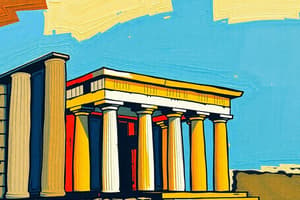Podcast
Questions and Answers
Jaki był cel Ksiąg Sybillińskich?
Jaki był cel Ksiąg Sybillińskich?
- Regulowanie życia społecznego i politycznego.
- Przewidywanie przyszłości i udzielanie porad. (correct)
- Utrwalanie tradycji i obyczajów rzymskich.
- Dokumentowanie historii Rzymu.
Na czym polegała różnica między prawem zwyczajowym a prawem ustanowionym w starożytnym Rzymie?
Na czym polegała różnica między prawem zwyczajowym a prawem ustanowionym w starożytnym Rzymie?
- Prawo zwyczajowe było oparte na tradycji i obyczaju, a prawo ustanowione było stworzone przez władze. (correct)
- Prawo zwyczajowe było obowiązujące tylko w prowincjach, a prawo ustanowione w Rzymie.
- Prawo zwyczajowe obowiązywało tylko plebejuszy, a prawo ustanowione patrycjuszy.
- Prawo zwyczajowe było ustne, a prawo ustanowione było spisane.
Które z poniższych pojęć nie odnosi się do elementu architektury rzymskiej?
Które z poniższych pojęć nie odnosi się do elementu architektury rzymskiej?
- Akwedukt
- Martyria (correct)
- Forum
- Termy
Jaki był główny cel budowy dróg w Rzymie?
Jaki był główny cel budowy dróg w Rzymie?
Co charakteryzowało Stoicyzm, nurt filozofii Hellenistycznej?
Co charakteryzowało Stoicyzm, nurt filozofii Hellenistycznej?
Które z poniższych wydarzeń miało największy wpływ na rozwój chrześcijaństwa?
Które z poniższych wydarzeń miało największy wpływ na rozwój chrześcijaństwa?
Co oznaczało pojęcie "Mesjasz" w judaizmie?
Co oznaczało pojęcie "Mesjasz" w judaizmie?
Jaki był główny powód konfliktów między Żydami a Rzymianami w Judei?
Jaki był główny powód konfliktów między Żydami a Rzymianami w Judei?
Flashcards
Księgi sybillińskie
Księgi sybillińskie
Zbiór odpowiedzi przez kapłanów na pytania Rzymian.
Stoicyzm
Stoicyzm
Filozofia propagująca życie zgodne z naturą i rozumem.
Prawo zwyczajowe
Prawo zwyczajowe
Zwyczaj akceptowany jako prawo przez długotrwałe stosowanie.
Koloseum
Koloseum
Signup and view all the flashcards
Ewangelia
Ewangelia
Signup and view all the flashcards
Gmina
Gmina
Signup and view all the flashcards
Termy
Termy
Signup and view all the flashcards
Meczennik
Meczennik
Signup and view all the flashcards
Study Notes
Roman Concepts
- Books of the Sybils: Books containing prophesies, guarded by priests.
- Cults: Groups of people who practiced religious beliefs, divided into private and public.
- Public Spectacles: Shows of various kinds, including theatre and gladiator contests.
- Law: Roman understanding of law was flexible, adapting to societal needs, with rules and customs. Customary law was as important, if not more important, than written law.
- Rhetoric: The art of persuasive speaking.
- Stoicism: A philosophy emphasizing virtue, reason and acceptance of fate.
- Aqueducts: Structures that brought water to cities.
- Thermae: Public baths, divided into sections for men and women
- Insulae: Multistory apartment buildings.
- Roads: Extensive Roman road network with a total length of 70,000km. The Via Appia was one of the most important roads.
- Post Office: Managed the delivery of correspondence.
- Colosseum: Large amphitheater, a notable Roman building.
- Mosaic: Decorative floor and wall art using small stones or tiles.
- Frescoes: Wall paintings on wet plaster.
- Forum: Public space in the center of cities, a political hub
Roman Society
- Gladiators: Famous combatants in public competitions.
- Games: Racing and gladiator spectacles were common public entertainments.
- Judaism: Jewish religious groups such as Sadducees and Pharisees existed in Judea at the time.
- Messiah: A hoped for saviour/king.
- Zealots: Jews who sought to fight for their freedom against Rome.
- Christianity: Began with Jesus and spread by his followers.
- New Testament: Part of the Christian bible.
- Churches: Communities or groups of believers, also known as congregations.
- Bishops: Leaders of Christian communities.
- Martyrs: People who died for their faith.
Geography
- Judea: Roman province during this period.
Additional Terms
- Language: Greek language texts were translated and recorded.
Studying That Suits You
Use AI to generate personalized quizzes and flashcards to suit your learning preferences.



